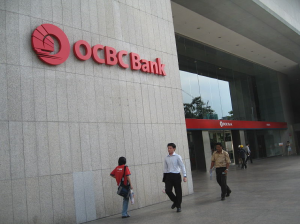OCBC Bank launches framework that gives Singapore SMEs increased access to sustainable financing
 On Dec 1, OCBC announced that it has adopted the Equator Principles, an internationally-recognised risk management framework adopted by financial institutions worldwide which will guide how the Bank determines, assesses and manages environmental and social (E&S) risks in projects. This move is part of the Bank’s ongoing push towards responsible financing and builds on its previous commitments to sustainability.
On Dec 1, OCBC announced that it has adopted the Equator Principles, an internationally-recognised risk management framework adopted by financial institutions worldwide which will guide how the Bank determines, assesses and manages environmental and social (E&S) risks in projects. This move is part of the Bank’s ongoing push towards responsible financing and builds on its previous commitments to sustainability.
Earlier this year, the Bank announced an ambitious new target of S$25 billion by 2025 for its sustainable finance portfolio after surpassing its initial target of S$10 billion in the first quarter of 2020 – two years ahead of schedule. Notable deals include an A$25 million green loan to ComfortDelGro to finance a hybrid bus fleet in Australia, a S$1.95 billion green club loan to M+S Pte. Ltd. for Marina One, and a sustainability-linked trade facility to support the trade and shipment of 50,000 metric tonnes of sustainably sourced sugar, valued at almost US$16 million.
The Equator Principles (EPs) is recognised internationally as the “gold standard” for E&S Risk Management for infrastructure projects. It establishes a common standard for determining, assessing and managing environmental and social risks in large-scale development projects. The EPs is based on the International Finance Corporation (IFC) Performance Standards published by the World Bank Group and covers a majority of the project finance transactions originating from emerging markets, providing a minimum standard for due diligence and monitoring to support responsible risk decision-making.
OCBC Bank’s voluntary adoption of the EPs is an extension of the Responsible Financing framework which the Bank has put in place since 2017. The existing framework on responsible financing spells out a range of policies and practices to ensure that the financial services provided by the Bank do not adversely impact people, communities or the environment.
As a signatory of the Equator Principles, OCBC Bank will further strengthen its Environmental, Social and Governance (ESG) related disclosure and reporting by disclosing information related to large-scale projects the Bank has financed globally. This will ensure that strict environmental and social standards are applied in line with the international best practices including the IFC Performance Standards during the project development and construction process, including follow-up monitoring.
OCBC Bank has also developed a framework – the OCBC SME Sustainable Finance Framework – that makes it simpler and less costly for Singapore small and medium enterprises (SMEs) to access sustainable financing of up to S$20 million to accelerate their sustainability plans.
SMEs will no longer need to spend time and resources to develop bespoke sustainable finance frameworks, prior to applying for sustainable financing, to show that the proceeds will be deployed in accordance with internationally recognised green standards.
The financing framework is for SMEs that are involved in sustainable financing activities across eight Green Project Categories eligible under the Green Loan Principles by the Loan Market Association.
| Eight Green Project Categories | |
| 1. Clean transportation
2. Eco-efficient and/ or circular economy adapted products, production technologies and processes 3. Energy efficiency 4. Green buildings |
5. Environmentally sustainable management of living natural resources and land use
6. Pollution prevention and control 7. Renewable energy 8. Sustainable water and wastewater management |
To ensure that a wider group of SMEs can access sustainable financing, the new Framework is also applicable to projects in these eight categories that do not have internationally or nationally recognised sustainable certification schemes established. An example is the Building and Construction Authority’s Green Mark Scheme.
The new framework was supported through the Monetary Authority of Singapore’s Green and Sustainability-Linked Loan Grant Scheme.
The sustainable financing provided through this new framework can be in the form of solutions such as green loans, green letters of credit and green banker’s guarantee.
The OCBC SME Sustainable Finance Framework has been verified by V.E, a global leader in ESG assessments, data, research, benchmarks and analytics, in accordance with the Green Loan Principles (GBP). V.E is of the opinion that “OCBC SME Sustainable Finance Framework” is aligned with the four core components of the Green Loan Principles, including clearly identified expected sustainable benefits.
Mr Linus Goh, Head, Global Commercial Banking, OCBC Bank, said: “We are pleased to launch the OCBC SME Sustainable Finance Framework, developed with the support of the newly-launched MAS grant scheme for green and sustainability-linked loans.
As a leading SME bank in the region, our ambition is to make SME financing green — to help SMEs in the shift towards greener businesses and sustainable development. Over the past two years, we have supported SMEs and mid-cap corporates in their maiden green loans and projects in green buildings, hospitality, construction and solar projects totalling over $1.6 billion.
This framework is designed to make it simple for SMEs to access green financing for their businesses and projects, without the complexity and cost of establishing a customised framework for each company. We believe this will help our SME customers accelerate their sustainability plans — both the SMEs which are enabling the change of industries and businesses as service providers in sustainability-linked efforts such as renewable energy, sustainable water and waste water treatment, as well as SMEs across all industries which are beginning to evaluate and adopt sustainability practices in their businesses, directing investments into green businesses, technology and infrastructure.”
Adriana Cruz Felix, V.E Head of Sustainable Finance Research, stated, “SME’s contribute significantly to growth, employment and innovation and supporting their efforts will be vital in order to reach the United Nations’ Sustainable Development Goals and post-COVID recovery. We are proud to have supported OCBC in this innovative mission which will help mobilise the flow of sustainable finance towards regional SMEs”






